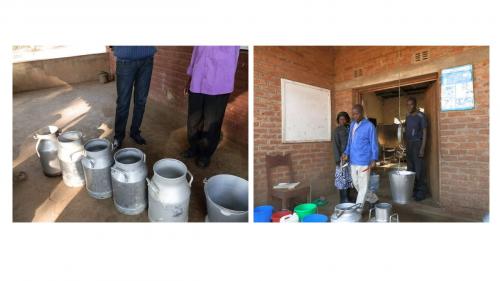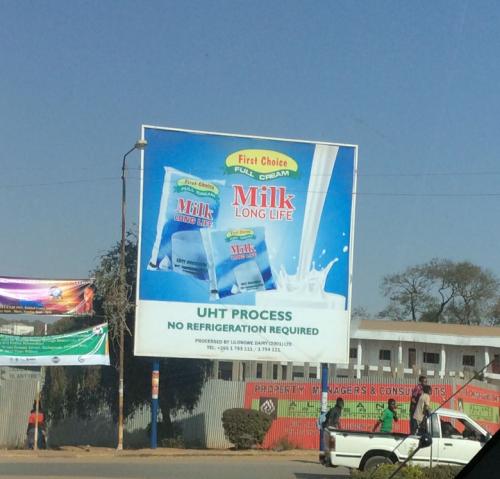Sandy Smith's blog
Volunteer Work Plan with MMPA August 6, 2015
 On Thursday, during my first week in Lilongwe, I met with the Malawi Milk Producers Association to determine their needs and expectations. I met with Herbert Chagona and Philip Chidawati. Herbert studied at Memorial University in Newfoundland before returning to Malawi to manage the MMPA. Phillip studied at the University in Lilongwe.
On Thursday, during my first week in Lilongwe, I met with the Malawi Milk Producers Association to determine their needs and expectations. I met with Herbert Chagona and Philip Chidawati. Herbert studied at Memorial University in Newfoundland before returning to Malawi to manage the MMPA. Phillip studied at the University in Lilongwe.
We discussed the issues concerning milk quality and arrived at the 3 following areas of focus:
IMO 1- Review milk quality control systems through assessment and validation of testing procedures. Provide training to milk handling groups including MBG milk buyers and executive committee.
IMO 2- Ensure equal representation of women and men in training activities to reflect their participation in the milk management chain
IMO 3-Prepare reports for the Malawi Milk Producers Association (MMPA) and Uniterra. The milk is delivered by the farmers to the Milk Bulking Groups (MBG)where it is tested using a alcohol test and a lactometer.
The alcohol test makes the assumption that if the milk coagulates when mixed 50:50 with a certain concentration of alcohol it is unacceptable. This theory is base on the possibility that increased protein in the milk, caused by bacterial growth or somatic cells present due to mastitis in the cow, will clump in the presence of alcohol. The lactometer test is a measure of specific gravity, which may be low because the farmer has added water to the milk. MMPA is concerned that the processor, who provides the alcohol, is testing the milk with a higher concentration of alcohol than required and therefore, rejecting milk unnecessarily. When that happens the farmer does not get paid.
The work plan included visiting 2 MBGs, one which cools the bulked milk using electricity and the other which cools the milk using diesel. During these visits the test results from the alcohol test would be compared to those achieved from using known percentages of alcohol from pre-prepared dilutions. Following the visits to review testing practices we would return to provide training for the farmers and the farmer's committees who run the MBG.
Orientation to Malawi, August 4th and 5th, 2015
 The first two full days in Malawi were spent in orientation at the WUSC office. Orientation included security and communication training, a visit to the African Bible College clinic for a health briefing and lunch with other volunteers on both days which provided an opportunity to get some first hand knowledge of their experiences. A highlight of the orientation was the language training given by Mr. Saili Mwale.
The first two full days in Malawi were spent in orientation at the WUSC office. Orientation included security and communication training, a visit to the African Bible College clinic for a health briefing and lunch with other volunteers on both days which provided an opportunity to get some first hand knowledge of their experiences. A highlight of the orientation was the language training given by Mr. Saili Mwale.
Chichewa is the language of Malawi. We learned to say basic phrases such as Muli bwanji (how are you?), Ndili bwino, kaya inu (I am good, and you?) and Ndili bwino, zikomo (I am good, thank you). I used these phrases on everyone at the hotel, at the milk bulking groups, at the Malawi Milk Producers and at WUSC. Even though the responses were too fast for me (lesson learned), especially at the beginning, the people that I talked to were surprised and pleased that I made the attempt. And it was good fun.
The orientation also included a trip to the chitenje market. It was a bit chaotic. The aisles were very tight and full of people going in and out. There were used goods everywhere mixed in with raw meat and of course the chitenjes. A chitenji is a length of fabric that the women wear as a skirt. The fabric is bright and beautiful; it makes it very hard to choose. I bought 2 metres of fabric and wore it for a training session at one of the milk bulking groups out of respect for the women farmers. The best advice was to wear the chitenge over your clothes because it is held on by a simple tuck and it would be quite embarassing if it fell off.
Arrival in Malawi August 3rd, 2015
Travel to Malawi included an overnight flight from Toronto to Amsterdam, and after a day (9hr) in the airport, another overnight flight to Nairobi, Kenya. The next flight was from Nairobi to Lilongwe. the capitol of Malawi. In all the trip took about 40hours. However, I traveled with my fellow WUSC volunteer, David Prescott, which made it a very pleasant trip. We arrived in Lilongwe about an hour late but were immediately met by Yanara Marks, our contact in Malawi. Thank you Yanara!
From the airport we travelled immediately to the Riverside Hotel. As we walked down the hall to our rooms the power went out. Power outages are very common in Lilongwe because the demand on the power grid exceeds capacity. On Sundays, we discovered, the power goes off for most of the day, presumably to do some maintenance on the grid but it may be for power sharing.
The Riverside Hotel had WiFi. That is, there is WiFi when it is working. Generally speaking, it does not work in the afternoon probably because that is when the demand is the highest. It also does not work when the manager of the hotel changes the password. And it is not easy to find out what the new password is as we found out the hard way.




